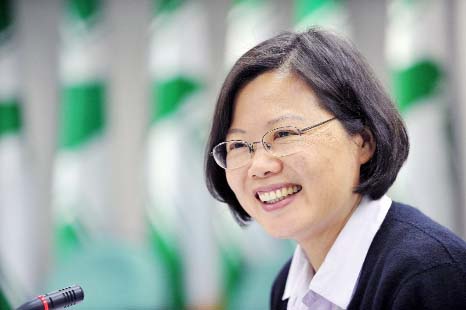
AFP, Taipei :
Taiwan will not bend to pressure despite China returning to its “old ways” of intimidation, President Tsai Ing-wen said on Saturday, following Beijing’s protests over her call to US President-elect Donald Trump.
China has stepped up military drills near Taiwan since the call earlier in December, in a move seen as putting on a show of strength as its ties with the self-ruled island and the United States deteriorate.
The call with Trump upended decades of diplomatic precedent in which Washington has effectively ignored Taipei in favour of Beijing, which considers Taiwan a breakaway province to be brought back within its fold. In her end-of-year address, Tsai urged calm from Beijing and warned that recent actions by China were affecting cross-strait stability.
“Beijing authorities are returning to their old ways of isolating and suppressing Taiwan, and even of threats and intimidation,” Tsai said.
“We hope this is not a policy decision by Beijing,” she said. “We won’t bend to pressure yet we also won’t return to the old path of confrontation.”
The Taiwanese leader called on Beijing to resume dialogue to find a “reasonable” solution. China cut off official communications with Tsai’s government after it refused to accept Beijing’s interpretation of the “One China” concept.
Taiwan’s defence minister warned Tuesday that enemy threats were growing daily after China’s aircraft carrier and a flotilla of other warships passed south of the island.
Tsai said Saturday that Taiwan was “sufficiently capable” of handling the challenges and changes it was facing, whether they were national defence or economic issues, and that people should not “overly panic”. The two sides split in 1949 after a civil war but Beijing still claims the self-ruling island as part of its territory and has not ruled out using force to bring about unification.
The Taiwan Strait that separates them has been heavily fortified for decades.
“Whether cross-strait relations can be turned around next year depends on our patience and belief,” Tsai told reporters.
Tsai is scheduled to transit through the United States when she travels to Central America in January, stopping in Houston and San Francisco.
Beijing has asked Washington to bar Tsai from flying through its airspace.
Meanwhile, there is no space for Hong Kong independence in the “one country, two systems” agreement under which Beijing governs the former British colony, but there can be tolerance for differences in their systems, a senior Chinese official said.
Chinese leaders are increasingly concerned about a fledgling independence movement in Hong Kong, which returned to mainland rule in 1997 with a promise of autonomy known as “one country, two systems”, and recent protests in the city.
Taiwan will not bend to pressure despite China returning to its “old ways” of intimidation, President Tsai Ing-wen said on Saturday, following Beijing’s protests over her call to US President-elect Donald Trump.
China has stepped up military drills near Taiwan since the call earlier in December, in a move seen as putting on a show of strength as its ties with the self-ruled island and the United States deteriorate.
The call with Trump upended decades of diplomatic precedent in which Washington has effectively ignored Taipei in favour of Beijing, which considers Taiwan a breakaway province to be brought back within its fold. In her end-of-year address, Tsai urged calm from Beijing and warned that recent actions by China were affecting cross-strait stability.
“Beijing authorities are returning to their old ways of isolating and suppressing Taiwan, and even of threats and intimidation,” Tsai said.
“We hope this is not a policy decision by Beijing,” she said. “We won’t bend to pressure yet we also won’t return to the old path of confrontation.”
The Taiwanese leader called on Beijing to resume dialogue to find a “reasonable” solution. China cut off official communications with Tsai’s government after it refused to accept Beijing’s interpretation of the “One China” concept.
Taiwan’s defence minister warned Tuesday that enemy threats were growing daily after China’s aircraft carrier and a flotilla of other warships passed south of the island.
Tsai said Saturday that Taiwan was “sufficiently capable” of handling the challenges and changes it was facing, whether they were national defence or economic issues, and that people should not “overly panic”. The two sides split in 1949 after a civil war but Beijing still claims the self-ruling island as part of its territory and has not ruled out using force to bring about unification.
The Taiwan Strait that separates them has been heavily fortified for decades.
“Whether cross-strait relations can be turned around next year depends on our patience and belief,” Tsai told reporters.
Tsai is scheduled to transit through the United States when she travels to Central America in January, stopping in Houston and San Francisco.
Beijing has asked Washington to bar Tsai from flying through its airspace.
Meanwhile, there is no space for Hong Kong independence in the “one country, two systems” agreement under which Beijing governs the former British colony, but there can be tolerance for differences in their systems, a senior Chinese official said.
Chinese leaders are increasingly concerned about a fledgling independence movement in Hong Kong, which returned to mainland rule in 1997 with a promise of autonomy known as “one country, two systems”, and recent protests in the city.

